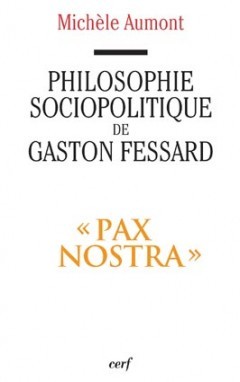Michèle Aumont ose inviter, au début du IIIe millénaire, à pénétrer dans " Pax nostra ", cette œuvre de philosophie sociopolitique qu'a publiée en 1936 le jésuite humaniste Gaston Fessard ! Cet ouvrage complète l'autre volume, où Michèle Aumont peint la figure et l'itinéraire de ce témoin ignatien du XXe siècle : " Que l'homme puisse créer ". Ces deux livres présentent ainsi cet humanisme chrétien si rayonnant de Gaston Fessard ; la foi catholique s'y dévoile comme ferment majeur : " Que l'homme puisse créer " témoigne, lui, de l'humanisme capable de surgir d'un être, de surgir d'un engagement, tous les deux enracinés dans la tradition catholique vivante, et tous les deux irrigués par le charisme de saint Ignace. Qu'apporte " Philosophie sociopolitique de Gaston Fessard : "Pax nostra" " ? C'est un examen de conscience international. Les écrits sociopolitiques prophétiques de Gaston Fessard n'éclairent pas seulement ce qu'allaient être les périodes de la seconde Guerre mondiale (1939-1945) et son " après-guerre ". Au lieu de parler de prophétisme, ne devrait-on pas insister sur l'approfondissement fessardien, un authentique encouragement : alors qu'une conscience malheureuse occasionne vite le découragement, ici une intense existence spirituelle et une vie de prière chrétienne annoncent l'avènement d'un nouveau pas en faveur de l'humanisation. En histoire de la morale politique, surgit un réel enrichissement apporté par Gaston Fessard et par les analyses de Michèle Aumont. La gravité de la quête de justice en politique a besoin d'un retour historien et spirituel à ces sources éprouvées. -- At the dawn of the third millennium, Michèle Aumont boldly invites us to peruse the pages of "Pax nostra', a work of socio-political philosophy published by the Jesuit humanist Gaston Fessard, in 1936! This book completes a first publication, "Que l'homme puisse créer', in which Michèle Aumont describes this 20th century disciple of Saint Ignatius and his itinerary. Gaston Fessard's radiant Christian humanism is presented in the two volumes, and the Catholic faith is revealed to be its major fermenting agent. "Que l'homme puisse créer' tells of humanism that can rise up in a human being, or from a commitment: both rooted in the living Catholic tradition and both nourished by the charisma of Saint Ignatius. So what does this book contribute? It is an international examination of conscience. The prophetic socio-political writings of Gaston Fessard do not only cast light on what were to become the years of the Second World War and its aftermath. Rather than speak of prophecy, we should insist on the Fessard's depth: an authentic encouragement. While an unhappy conscience is immediately discouraging, here, an intense spiritual existence and a life of Christian prayer proclaim the advent of a new and humanising step ahead. Gaston Fessard and Michèle Aumont's analyses make a real contribution to the history of political morals. The urgent quest for justice in politics necessitates that we return to these well-tested historical and spiritual sources.




